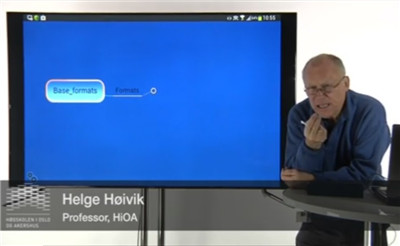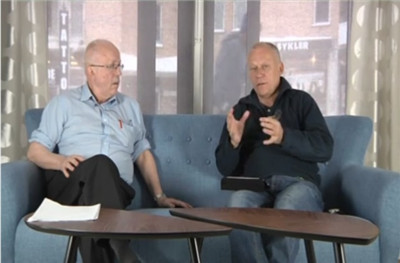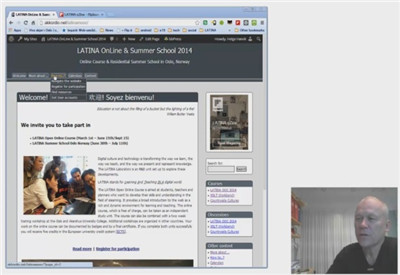 The training class “New Technology Application in Education” officially began on March 1. It was presented by the Research and Development Centre for the Integration and Application of Digital Learning Technologies (RDCIADLT), Ministry of Education, China, based in the Open University of China (OUC) in cooperation with Latina Lab of Oslo University College of Norway.
The training class “New Technology Application in Education” officially began on March 1. It was presented by the Research and Development Centre for the Integration and Application of Digital Learning Technologies (RDCIADLT), Ministry of Education, China, based in the Open University of China (OUC) in cooperation with Latina Lab of Oslo University College of Norway.
Only 10 students have been enrolled from the radio and television universities all over the country.

LATINA Lab Teaching Platform

Home Page of the OUC Training Platform for Online Education Employees
This training class offers online learning through Latina Lab’s teaching platform, and focuses on the course “LATINA OOC 2014”. Students can choose from several modules that make up the course “New Technology Application in Education” making up the training programme for the OUC Online education employees.
All of the programme's classes will be delivered in English, with the class scheduled to last until the end of September, covering a total of 28 weeks. Upon the completion of the training the students will get a certificate jointly issued by Oslo University College and the RDCIADLT. The teaching team led by Professor Helge Hoviok from Oslo University College work as tutors together with 3 researchers from the RDCIADLT.


Video Conference with LATINA Lab Teaching Team
As the class began on March 12, using a video conferencing system, the RDCIADLT tutoring team and the Latina Lab teaching team first implemented their strategy for combined teaching. Professor Helge Hoviok introduced main points that should stand out in class and introduced expectations for the tutors. The RDCIADLT tutoring team has set up a 13-person learning group made up of teaching assistants and learners, a QQ group, and a WeChat public platform to facilitate the dissemination of information, learning guidance, and personal exchanges that will help keep the students progressive by taking into account such factors as work/study conflicts and the personal commitments of the 10 students.

LATINA OOC 2014 Course
Over the past two weeks of study, the RDCIADLT tutors and students have noticed many advantages to the“LATINA OOC 2014” course, insights which are valuable to current OUC development and construction of online core courses. The advantages are as follows: The text-video format is very effective; it is neat, unaffected, clear, and easy to understand. There is a great wealth of study material. Online learning is combined with offline experience. Self-directed learning is encouraged, and quizzes are arranged after each chapter of a lesson, with only those scoring 80 percent or better moving on to the next chapter. Professors are also able to monitor and check each student's records and clearly chart their progress.
The OUC training programme for online education employees developed the course “New Technology Application in Education” in 2012 in order to explore emerging information technology and its application in teaching and learning. On September 2, 2013, OUC President Yang Zhijian, on behalf of the RDCIADLT proposed to Professor Helge Hoviok a proposal to work as a member of the RDCIADLT Technology Committee, and the Latina Lab, where Professor Helge Hoviok works, was invited to join in the RDCIADLT support alliance. A cooperation framework has been established, with the primary objective of “organizing a joint research team, building a cooperative research platform, developing mobile terminal-based micro-lectures together, forming an online-learning-and-offline-experience curriculum, and exploring a cooperative mechanism with international coordination”. The current project is being undertaken within this framework and in pursuit of the stated objective.
By Wu Shuping, Hou Songyan, and Wei Shunping, the OUC